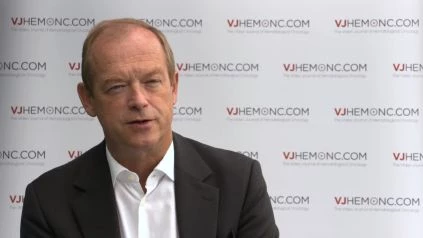Michael Hallek, MD, PhD of the University of Cologne, Cologne, Germany discusses highlights from the 2016 International Workshop of the German CLL Study Group (GCLLSG) held in Cologne, Germany. Prof. Hallek explains that world experts in the field of chronic lymphocytic leukemia (CLL) attend the workshop. In terms of the biology of CLL, we are now starting to understand the functional consequences of the deletion 13q, which is the most frequent aberration. He highlights the presentation by Prof. Carlo Croce on microRNAs and how their regulation is heavily disturbed in CLL, which leads to the upregulation of BCL2. BCL2 is the target of venetoclax, which is the most potent drug currently available. Further, ROR1 is regulated by the same microRNA and targeting ROR1 and BCL2 may be synergistic. In terms of therapy, Prof. Hallek mentions that the first results of the trials of the GCLLSG are very encouraging; they will be updated at the ASH Annual Meeting. According to Prof. Hallek, we can already say that combinations of targeted agents, such as venetoclax plus antibodies or kinase inhibitors plus antibodies, induce a high number of complete remissions (CR) and minimal residual disease (MRD) negative remissions. In light of these advances, Prof. Hallek is very optimistic and the hope is that we may be able to control CLL in the near future. Of course, Prof. Hallek warns, it is important to remain cautious as the data requires time to mature.
[the_ad id="32629"]

